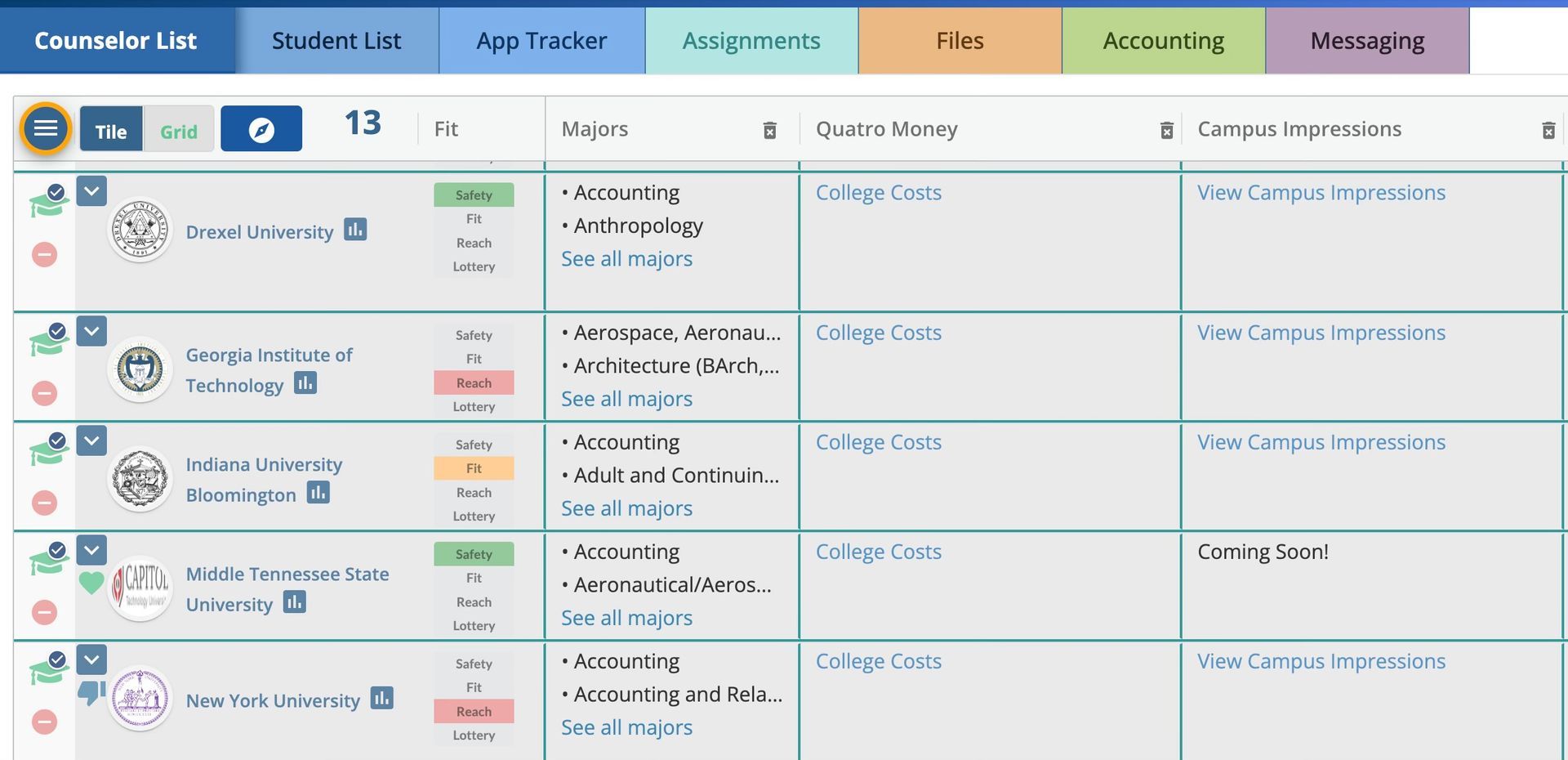Blog
Blog

By Jeanette Wright
•
April 4, 2025
College outcomes have been increasingly hard to predict for at least the past 10 years. Most of the popular colleges have received more applications with each subsequent year, much of the increase due to the ease of applying with online applications. UCLA for example, receive 145,910 undergraduate applications for the incoming class of 2023 and 146,276 for the class of 2024*. Many students have a few favorites and are disappointed when they don't get in. Despite student's and counselor's best efforts, admissions are unpredictable and students should plan for 'Option B' if they aren't offered a spot at their first choice college. After the period of disappointment passes, students should focus on the schools where they got in. Make a spreadsheet with pros/cons of each. Visit as many as your time and budget allow. Tour the department your major is in and ask well thought-out questions. Make an appointment with the financial aid office to ensure you fully understand what the school is offering you. See as much of the campus as possible and the surrounding area. While these steps might not take away all of the disappointment, it will help you make the best decision for you and your family and ultimately result in a positive experience in college. *https://apb.ucla.edu/campus-statistics/admissions

By Jeanette Wright
•
March 22, 2025
In the past few years, colleges have been using waitlists to manage their enrollment. Determining who will accept their offer for admission is often times unpredictable, so they rely heavily on the waitlist to help. Many of my students contact me asking what they should do. I tell them they should first see what the college requires. Opt-in to remain on the waitlist and if they allow it, send a letter of continued interest. Express that the colleges remains one of their top choices and why. Consider your major and and related club. If they allow for an additional recommendation letter from a teacher, coach or mentor, include it. Contact the admissions office and your specific admissions representative to ask questions. Be respectful of their time. If the colleges considers demonstrated interest, visit the campus when possible. There are no guarantees you will be offered a spot from the waitlist, so you should commit to another school. Sometimes the wait can be well-after the May 1 National College Signing Day, so sit back and wait and hope you will be offered a spot.

By Jeanette Wright
•
February 28, 2025
The Common App announced that the prompts for the 2025-2026 application cycle will remain the same and there will be changes to the two additional information questions. The "Community disruption" question will now be a "Challenges and circumstances" question. This is to allow students to included many different experiences. The "Additional information" question maximum word limit for undergraduate students will be 250 words, down from 650. Here is the personal essay questions for the 2025-2026 season. Some students have a background, identity, interest, or talent that is so meaningful they believe their application would be incomplete without it. If this sounds like you, then please share your story. The lessons we take from obstacles we encounter can be fundamental to later success. Recount a time when you faced a challenge, setback, or failure. How did it affect you, and what did you learn from the experience? Reflect on a time when you questioned or challenged a belief or idea. What prompted your thinking? What was the outcome? Reflect on something that someone has done for you that has made you happy or thankful in a surprising way. How has this gratitude affected or motivated you? Discuss an accomplishment, event, or realization that sparked a period of personal growth and a new understanding of yourself or others. Describe a topic, idea, or concept you find so engaging that it makes you lose all track of time. Why does it captivate you? What or who do you turn to when you want to learn more? Share an essay on any topic of your choice. It can be one you've already written, one that responds to a different prompt, or one of your own design. Details can be found here.

By Jeanette Wright
•
June 12, 2024
Stanford will once again require the SAT or ACT for undergraduate students applying in the fall of 2025. For students applying this fall 2024, they will remain test-optional. The following is an excerpt from the Stanford Report. Test scores represent only one part of a holistic review of each applicant to the university, for which academic potential is the primary criterion for admission. Performance on standardized tests is an important predictor of academic performance at Stanford, a review by the faculty Committee on Undergraduate Admission and Financial Aid has confirmed. The renewed testing requirement will allow Stanford to consider the fullest array of information in support of each student’s application. This follows announcements from other competitive schools like MIT, Harvard, Yale, University of Texas Austin, and Cal Tech to reinstate the requirement for standardized test scores for admissions. Since the Covid 19 pandemic started in 2020, colleges stopped requiring scores. But, many colleges believe these scores are a predictor of college success.

By Jeanette Wright
•
May 3, 2024
The UC Information Center has a large amount of data including admission for freshman by high school and UC campus. It's interactive so enter your high school to view statistics about the number of students admitted by ethnicity and GPA including average applied, admitted, and enrolled GPA, It also includes transfer student data. https://www.universityofcalifornia.edu/about-us/information-center/admissions-source-school. Here is an admissions summary. https://www.universityofcalifornia.edu/about-us/information-center/freshman-admissions-summary

By Jeanette Wright
•
April 8, 2024
It's spring and college decisions are rolling in. You were just waitlisted by another school. You have worked hard for 4+ years spending countless hours on homework, extracurricular activities, volunteering and researching the perfect college list. So what went wrong? What could you have done differently? In most cases the answer is nothing. Colleges are big business and meeting enrollment numbers is vital to their success. It's a calculated risk that happens every year beginning in the fall when students begin submitting their applications. Colleges have to decide which students they think will accept their offer of admission. They review your transcript and application and anything else you may have sent in. They also look at data from previous years about graduating seniors which may determine how many spots they have in particular departments. How does the waitlist work? Students are asked to "opt in' to stay on the waitlist. Some college allow for a letter of continued interest (LOCI) or a letter of recommendation. In the LOCI students should share any new activities, honors, awards, courses, and grades that weren't included in the initial application. They should do what the college allows and not try to circumvent the process by barraging admissions with phone calls and emails. They should also commit to another school that accepted them as waitlists are unpredictable and often it takes weeks or months for admissions to notify them. Waitlists are frustrating but a necessary part of college admissions given the growing number of applications for a limited number of spots at top universities.

By Jeanette Wright
•
March 12, 2024
The Common App has announced its prompts for 2024-2025. They will remain the same as last year. Some students have a background, identity, interest, or talent that is so meaningful they believe their application would be incomplete without it. If this sounds like you, then please share your story. The lessons we take from obstacles we encounter can be fundamental to later success. Recount a time when you faced a challenge, setback, or failure. How did it affect you, and what did you learn from the experience? Reflect on a time when you questioned or challenged a belief or idea. What prompted your thinking? What was the outcome? Reflect on something that someone has done for you that has made you happy or thankful in a surprising way. How has this gratitude affected or motivated you? Discuss an accomplishment, event, or realization that sparked a period of personal growth and a new understanding of yourself or others. Describe a topic, idea, or concept you find so engaging that it makes you lose all track of time. Why does it captivate you? What or who do you turn to when you want to learn more? Share an essay on any topic of your choice. It can be one you've already written, one that responds to a different prompt, or one of your own design. We will retain the optional community disruption question within the Writing section. Over the next year, we'll consult with our member, counselor, and student advisory committees to ensure we gather diverse perspectives and make informed decisions.

By Jeanette Wright
•
February 22, 2024
The competitive state of college admissions has made it more important than ever to build a balanced list of colleges. Start by knowing what you want to pay for college. This can be different than what you can afford. Do you want to stay in state or travel far from home? If you want to stay closer to home, look at state colleges as these will be most affordable. Be sure you can get the courses you need to graduate in four years as going a 5th year will add to your debt. Look at private colleges that will give local students merit aid. Consider colleges that you may not have heard of. Most students apply to same top schools because these are the names they hear. If you want to go out of state, look at the average merit aid awarded to out of state students. Collegedata.com is a good place to start. If you know what you want to major in, you can start by doing a simple Google search. Know that these searches often show only the most competitive colleges so refine your search criteria by adding "Affordable colleges for B students" or "Best in-state colleges for biology". CollegeXpress.com can help refine your search. Most importantly, take rigorous courses and work hard to keep your grades up as colleges know that these are two things that help determine how well you will do in college.

By Jeanette Wright
•
February 8, 2024
Due to the delayed release of the new simplified FAFSA this year, all University of California and California State University campuses have extended the deadline to commit to a college from the traditional May 1 deadline to May 15. This gives families two additional weeks to consider their financial aid offer. The transfer deadlines is still June 1.

By Jeanette Wright
•
February 5, 2024
Seniors, while you are waiting to hear from colleges, it's important to continue showing some interest in the college. You can do this by stating why you are a perfect fit for the major you chose or mentioning extracurricular activities that support your interests. Some colleges ask for a letter of continued interest if you have been deferred from the early action pool to the regular pool. Be sure to fill it out. If you have any new and compelling information like a significant community service engagement, a school or research project you completed, or a change in family circumstances, let the college know. Check to see what their policy is for reporting new information. Some want a form, others may want an email. Keeping your grades up is also important and most colleges look senior year grades.

858-354-2029
wrightcollegecounseling@gmail.com
wrightcollegecounseling@gmail.com